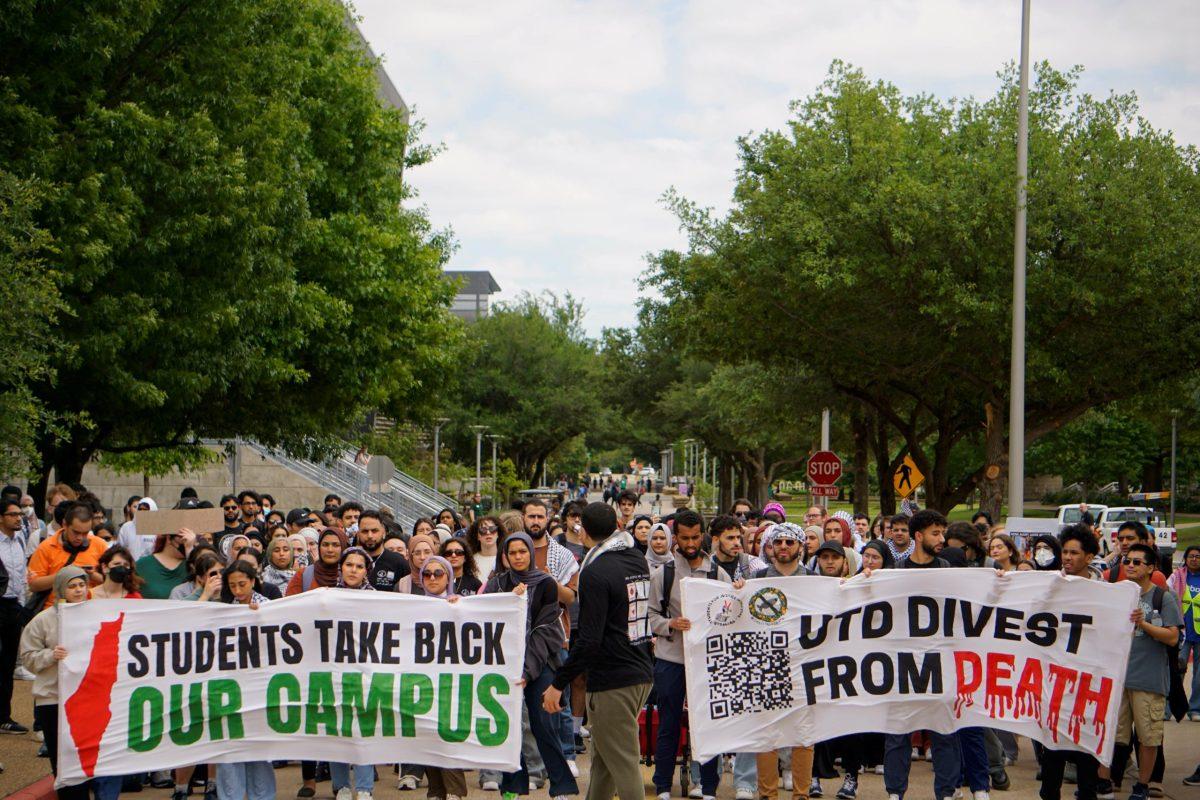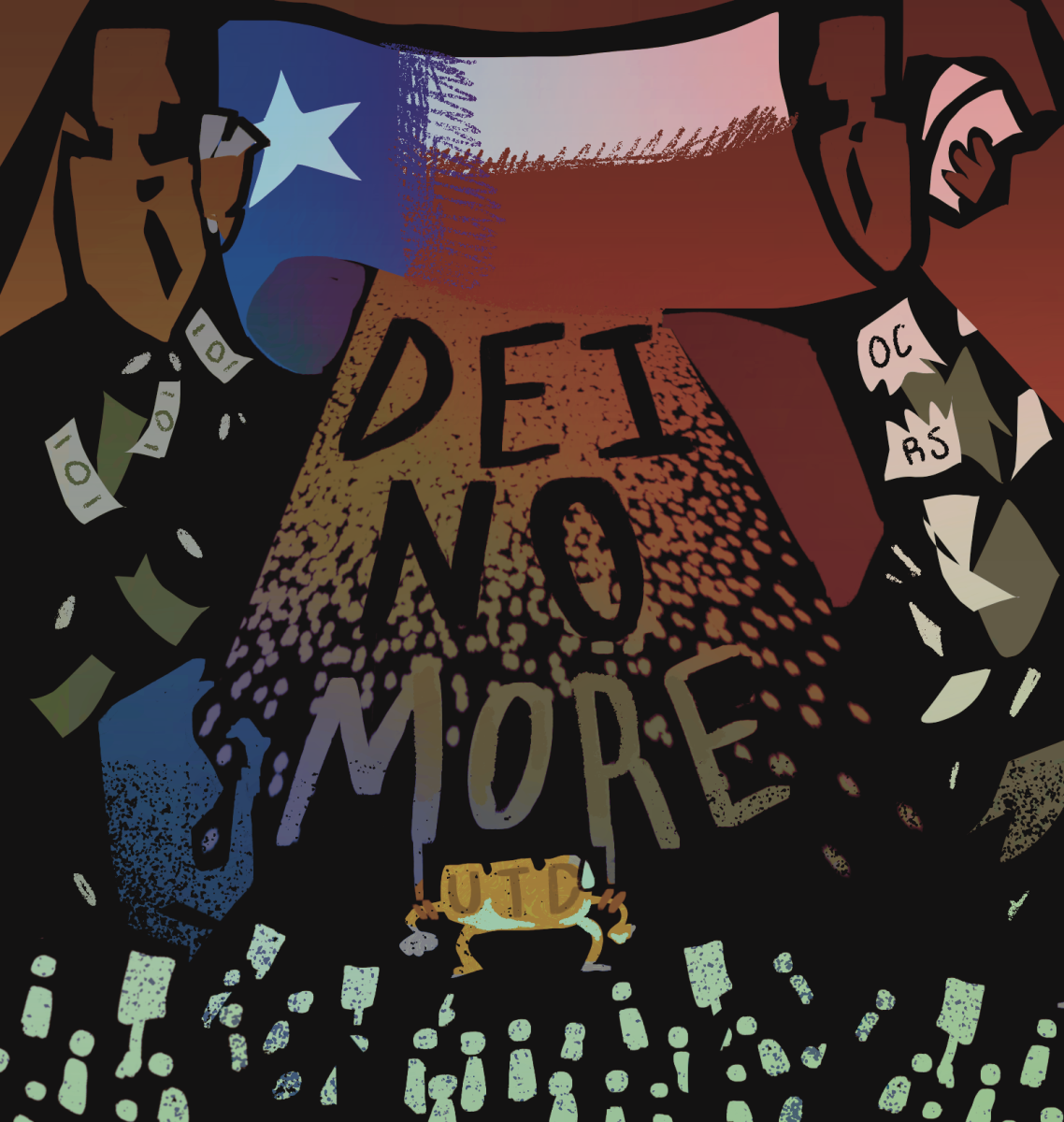At the climax of a nearly 10-hour long demonstration April 23, representatives from Students for Justice in Palestine and UTD’s Cabinet of the President agreed to a meeting to discuss the concerns of Palestinian students. During the meeting April 26, SJP representatives delivered a letter to Benson, refusing to speak with him, before leaving.
SJP’s rejection of the meeting comes after almost six months of protests at UTD calling for administrators to acknowledge the humanitarian crisis in Gaza. SJP, Palestinian Youth Movement and UTD Divest hosted April 23’s demonstration, called “UTD Take Back Our Campus.” Demonstrators had three demands: first, for UTD to reject Gov. Greg Abbott’s executive order GA-44, which specifically singles out SJP organizations when obligating universities to punish antisemitism and is a threat to freedom of speech according to the Foundation for Individual Rights and Expression. Second, for President Richard Benson to release a public statement denouncing the “ongoing genocidal campaign against the Palestinian people” — according to SJP’s Instagram — and call for an immediate permanent ceasefire in Gaza. Third, for UTD to divest from military contractors that sell weapons to Israel, like Raytheon Technologies, Lockheed Martin, Boeing, Northrop Grumman and General Dynamics. SJP’s April 26 letter said it rejected the meeting with the Office of the President on the grounds that Benson would also be meeting with a “Zionist organization.”
“We categorically reject the attempt to establish a premise that there are ‘two sides’ to a literal genocide,” Mousa Najjar, SJP president and computer science senior, said while reading a copy of the letter aloud at a demonstration in the Administration Building (AD) April 26. “We refuse to be pacified, we refuse for our message to be co-opted and we refuse to be intimidated.”
On April 23, approximately 100 protesters gathered at the Plinth at 1 p.m., calling for an end to the war in Gaza and for UTD to divest from military contractors. After marching down the Rutford pedestrian walkway, demonstrators gathered to pray for Gaza in front of AD before entering the building at 3 p.m. and staging a sit-in on the second floor — which leads to Benson’s office — until 10 p.m. UTDPD maintained a presence throughout the entire event and began blocking two out of the three main entrances into the building due to fire hazard concerns. On April 24, SJP hosted a second day of sit-ins at AD’s lawn. On April 26, 150 students and community members organized a sit-in on the admin lawn while SJP representatives visited admin.
“After consistent divestment efforts, two passed Student Government resolutions, dozens of events and literally hundreds of tablings, we have heard nothing from administration until today,” alumnus Nidaa Lafi, a former president of SJP, said during the sit-in. “If this shows us anything, it shows us that pressure works. Being in this building, this disgusting overheated building for [hours] does something right.”
While in the building, students made phone calls to Benson, Vice President of Student Affairs Gene Fitch and Dean of Students Amanda Smith to force administrators’ attention onto their demands. Demonstration leaders said they spoke with Vice President Rafael Martin later that night, who confirmed by email around 9 p.m. that he’d be in touch before the end of the day to schedule a meeting between Benson, two members of his leadership team and pro-Palestinian student representatives.
“We are still here making Palestine unavoidable on this campus,” said Nour Saad, SJP secretary and healthcare management senior, during the sit-in. “We mobilize to illustrate our devotion to the cause and our belief in liberation. In mobilizing, protesting and keeping the conversation about Palestine alive, we students stand as the beating heart of the movement.”
In a statement to the press, UTD said it would also meet separately with a Jewish student group for the same purpose. Jade Steinberg, a psychology freshman and president of UTD Hillel, said they received an invitation from administrators to attend this meeting, which has been delayed according to Steinberg.
“We are going to be at the meeting and calling on Benson to help make the university a more safe and inclusive space for all students,” Steinberg said.
Steinberg, who was present at the UTD demonstration holding an Israeli flag alongside four other counter-protesters, said they find chants such as “From the river to the sea, Palestine will be free” offensive toward Jewish students. GA-44, which will take effect June 25, states the phrase is antisemitic because it has been used by Hamas supporters to advocate for the violent dismantling of Israel.
“From my perspective … there is becoming a normalization of antisemitism, of hate and bigotry against us that has made us feel extremely unsafe, extremely threatened,” Steinberg said.
The protest was part of a larger national movement which has spawned at least 40 Gaza solidarity encampments, at the time of publication, at universities across the U.S., including Columbia, MIT and UC Berkeley. UTD protesters were in communication with students at Columbia in New York, which has seen 150 students and faculty arrested at their solidarity encampment as of April 24, adding to the 600 student activists arrested across the nation as of April 27. In response to prolonged encampment, the president of Columbia moved classes online for the remainder of the spring semester beginning April 23. Columbia is among 40 other universities, including MIT and UC Berkeley, that have set up occupation zones on campus in solidarity with those displaced from the war in Gaza.
“The Gaza liberation encampment [shines a] spotlight on the mass displacement in Gaza,” Saad said. “Nearly 2 million Palestinians live in tents and in shelters due to indiscriminate bombing[s] without access to food, water and basic life needs.”
April 23 marked 200 days since Hamas’ Oct. 7 attack on Israel, which killed 1,139 people. In response, Israel invaded Gaza; the invasion has killed over 34,000 Palestinians so far, including 14,000 children, and has displaced millions within an Israel-blockaded perimeter. Eighteen days into the conflict, Benson released a letter expressing sympathy for Israeli casualties without acknowledging casualties in Gaza, sparking a series of demonstrations and protest art and the eventual removal of the Spirit Rocks for “extended political discourse.” On Feb. 27, Student Government declared support for a permanent cease-fire with resolution S.R. 2023-12; last year SG passed S.R. 2022-40 or “Divest from Militarism,” and Benson said UTD leadership did not share the same view as SG’s senate shortly afterward, according to the Texas Jewish Post.
UTD’s SJP, along with Palestinian solidarity organizations at Columbia, Tufts and Rutgers-New Brunswick, are joining Popular University for Gaza — week-long education programs that teach students about the war in Gaza. College students have clashed with police in riot gear at Cal Poly Humboldt and Yale. In Texas, protests have occurred at the UT San Antonio, Texas A&M and UT Arlington, but there have been widespread arrests at UT Austin, where Abbott called in the Department of Public Safety with tactical gear despite no signs of violence. Fifty-seven UT Austin students have been arrested as well as a FOX 7 photojournalist, and all were initially charged with criminal trespassing before Travis County dropped all charges.
“The moral of the story is that if this sit-in doesn’t cut it, we’ll be back,” Lafi said. “We’re gonna continue pressure, we’re gonna continue momentum until divestment, until liberation, until return. Everything we did today and everything we will do is for our families in Gaza. We’re out here in solidarity with students in Columbia, with students all across the nation who are doing this … A win at UT Dallas is a win everywhere. A win at Columbia is a win everywhere. A win is a win everywhere. So we have to be committed to keep winning.”
This is an ongoing story that will be updated as more information comes forward. If you have any tips, please email [email protected] or [email protected].











